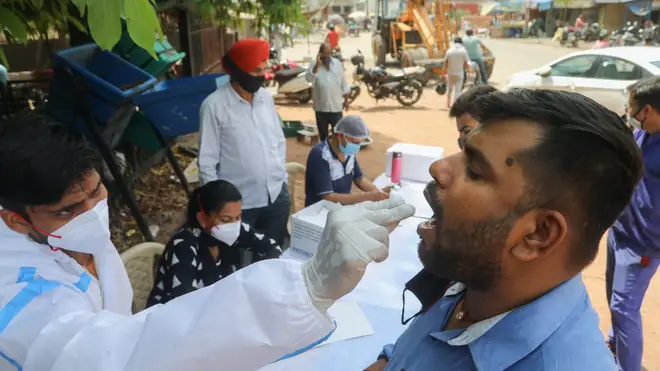
Ian Payne 4am - 7am
13 April 2021, 07:40 | Updated: 13 April 2021, 07:51

India is experiencing its worst surge in coronavirus cases, with more than 130,000 daily infections over the past week.
The spike across the country is particularly alarming because the country is a major vaccine producer and a critical supplier to the UN-backed Covax initiative, which aims to bring jabs to some of the world's poorest countries.
The rise in cases has already forced India to focus on its domestic demand, delaying deliveries to Covax and other countries including the UK and Canada. A continued surge could result in more delays.
Experts say missteps stemming from the belief that the pandemic was "over" are coming back to haunt the country.
READ MORE: Next phase of UK Covid vaccinations to begin after all over-50s offered dose
READ MORE: Moderna Covid vaccine to be rolled out in England today
When infections began plummeting in India in September, many concluded the worst had passed.
Masks and social distancing were abandoned, while the government gave mixed signals about the level of risk.
When cases began rising again in February, authorities were left scrambling.
"Nobody took a long-term view of the pandemic," said Dr Vineeta Bal, who studies immune systems at the city's Indian Institute of Science Education and Research.

Nick Ferrari scrutinises Hancock over significant vaccine drop
She noted that instead of strengthening existing hospitals, temporary sites were created.
In Pune, currently the country’s hardest-hit city, authorities are resurrecting one of those makeshift facilities, which was crucial to the city's fight against the virus last year.
The most likely cause behind the surge is the presence of more infectious variants, according to experts.
Health officials confirmed last month that 80% of infections in the northern state of Punjab were due to the variant first detected in the UK.
There is also increasing concern about another new and potentially troublesome strain first detected in India itself.
Many countries in Europe that saw declines in cases are also experiencing new surges, and infection rates have been climbing in every global region, partially driven by new variants.

Pfizer, Moderna and AstraZeneca: The Coronavirus Vaccines Explained
There have now been 13.5 million reported virus cases in India since the pandemic began - pushing its toll past Brazil's and making it second only to the US, though both countries have much smaller populations.
Deaths are also rising and have crossed the 170,000 mark. Those figures are likely to be an undercount, experts say.
Nearly all states are showing an uptick in infections, with Pune - home to four million people - left with just 28 unused ventilators as of Monday night for its more than 110,000 Covid-19 patients.
The country now faces the mammoth challenge of vaccinating millions of people, while also contact-tracing the tens of thousands getting infected every day and keeping the health system from collapsing.
India's vaccination drive could also be headed for trouble: Several Indian states have reported a shortage of doses even as the federal government insisted there is enough in stock.
The country recently overtook the US in the number of jabs it is giving every day and is now averaging 3.6 million.
But, with more than four times the number of people and following a sluggish start, it has given at least one dose to around just 7% of its population.
India's western Maharashtra state, home to Pune and financial capital Mumbai, has recorded nearly half of the country's new infections in the past week. Some vaccination centres in the state turned away people due to shortages.
At least half a dozen Indian states are reporting similarly low stocks, but Health Minister Harsh Vardhan has called these concerns "deplorable attempts by some state governments to distract attention from their failures".
Worries about vaccine supplies have led to criticism of Prime Minister Narendra Modi's government, which has exported 64.5 million doses to other nations.
Rahul Gandhi, the face of the main opposition party, asked Mr Modi in a letter whether the government's export strategy was "an effort to garner publicity at the cost of our own citizens".
India has now reversed course. Last month, Covax said shipments of up to 90 million doses of the AstraZeneca vaccines were delayed because the Serum Institute of India was prioritising domestic needs.
The institute, based in Pune and the world's largest vaccine maker, said earlier this month that it could restart exports of the vaccine by June - if new coronavirus infections subside.
Dozens of cities and towns have imposed partial restrictions and nighttime curfews to try to curb infections, but Mr Modi has ruled out the possibility of another nationwide lockdown.